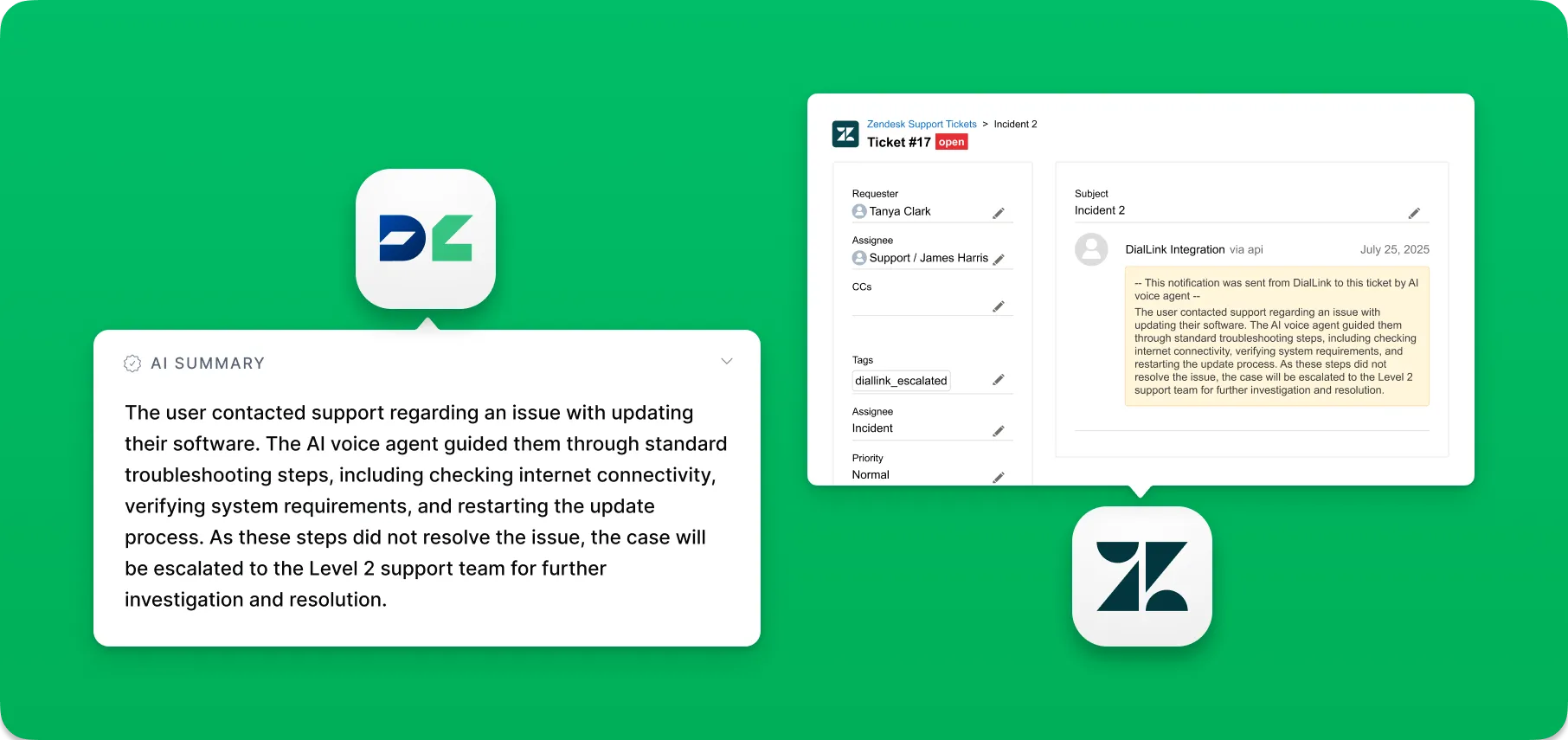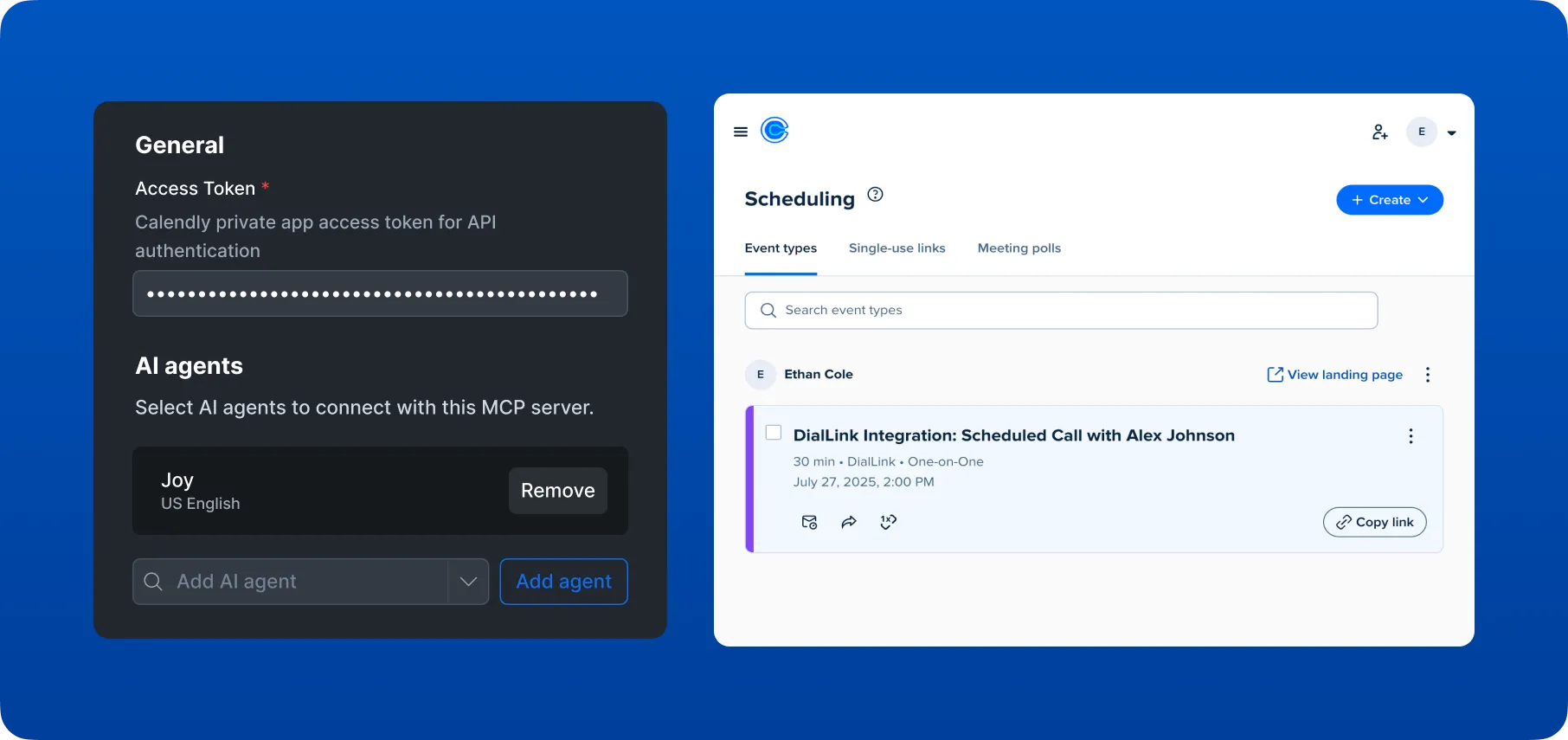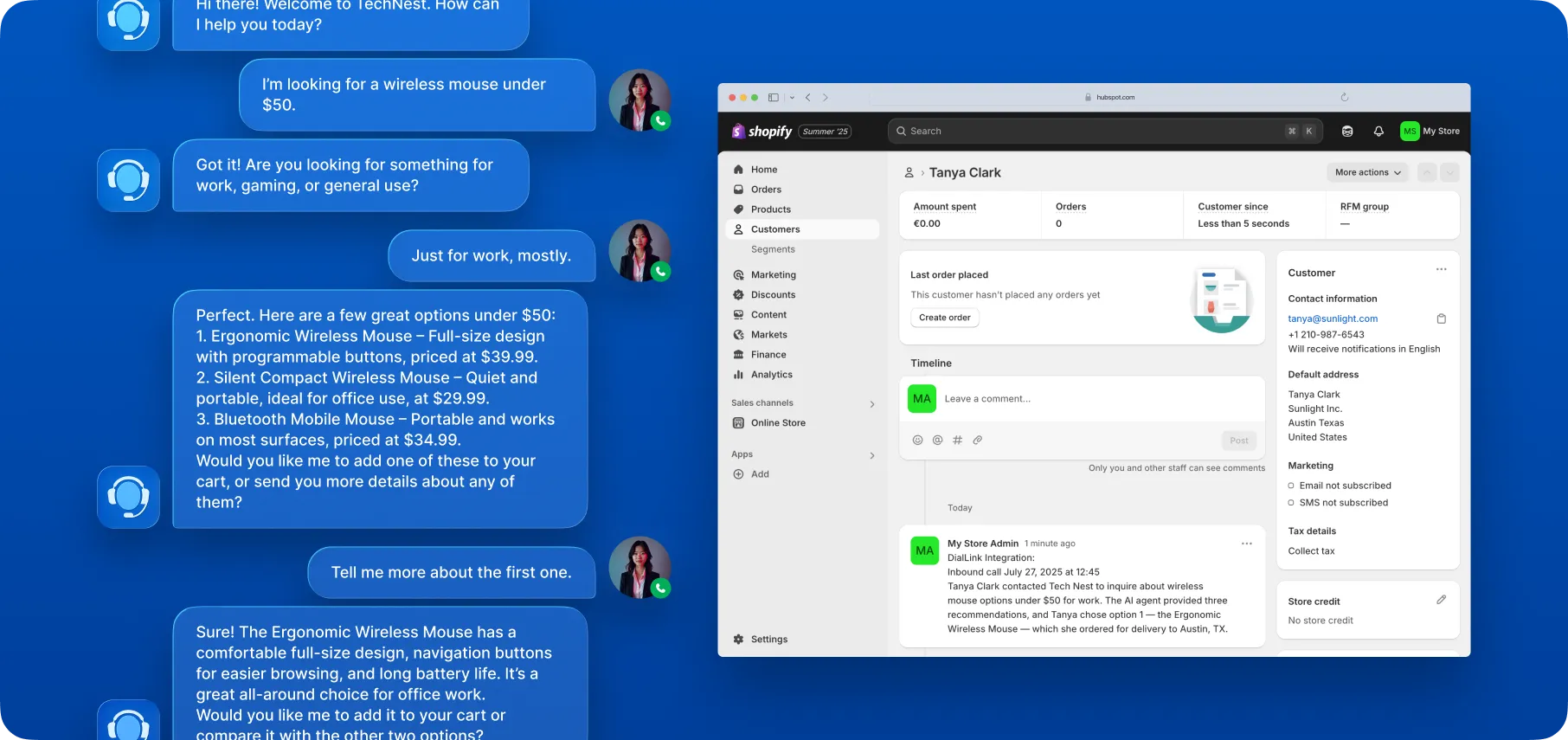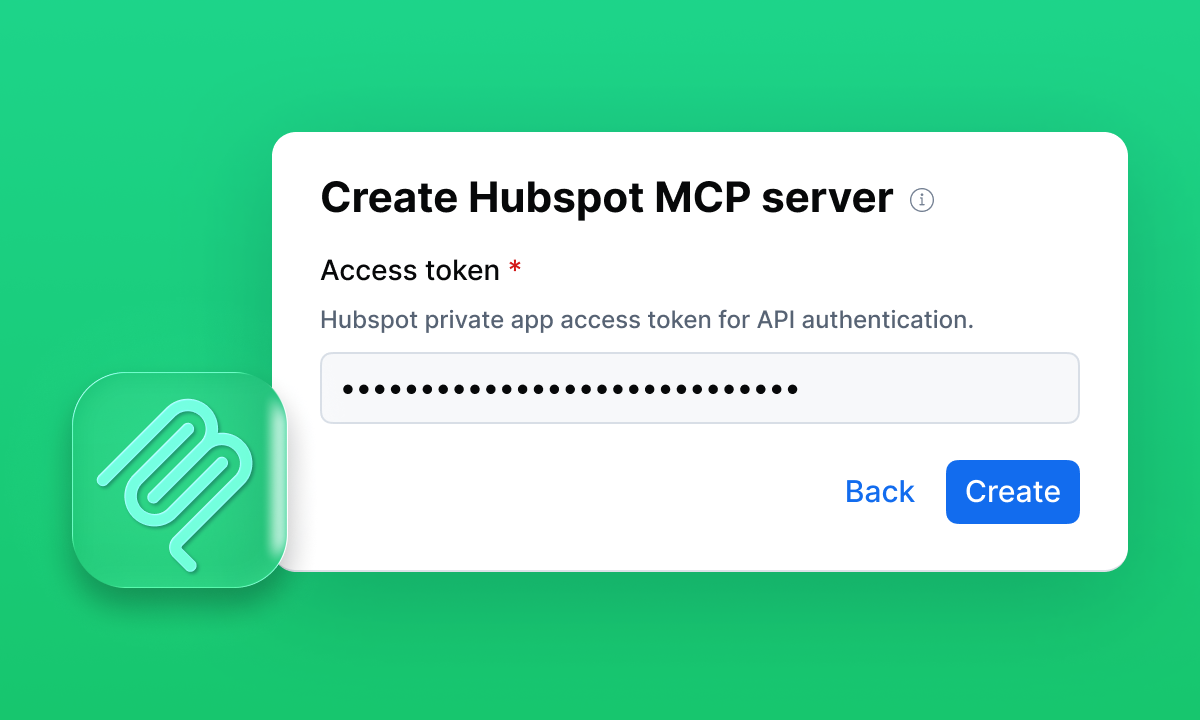
What Is MCP? A Guide to Model Context Protocol
Discover what Model Context Protocol (MCP) is, how it works, and why it’s revolutionizing AI voice agents, call automation, and integrations for SMBs and startups. Learn key benefits, detailed use cases, and future trends.
Introduction
The Model Context Protocol (MCP) is quickly becoming a foundational technology for the next generation of AI and automation. MCP offers an easy and safe method for AI systems. It allows them to access, share, and use information across various platforms quickly. This helps organizations streamline workflows, reduce integration overhead, and build AI that operates within a connected ecosystem.
MCP helps growing companies connect business tools and data sources. It does this without the high cost or complexity of traditional methods. By linking AI to CRMs, e-commerce platforms, scheduling tools, and other business systems, MCP changes AI. It becomes a proactive and integrated driver of business results instead of just a reactive assistant.
In this article, we’ll break down what MCP is, how it works, its core components, and the key benefits it brings to businesses. We’ll also look at practical examples and insights for teams considering adoption.
What Is MCP? (Model Context Protocol)
Model Context Protocol, or MCP, is an open standard. It explains how AI agents talk to and use external tools. The term “Model Context” means an AI system's ability to use real-time, specific information while it works. “Protocol” refers to the rules that guide this safe and organized interaction.
MCP helps an AI agent connect easily with the tools and data sources a business already uses. This includes CRMs, e-commerce systems, knowledge bases, and scheduling tools. It does this without needing custom integrations for each tool.
MCP offers a standard way for agents to request information, perform actions, and get organized responses. This means there is no need to create unique connectors for each application.
Think of MCP as a universal bridge between your AI and your business tools. With MCP, an AI voice agent can check order status, update Salesforce records, book meetings in Calendly, or pull inventory data in real time. It responds and acts as if it’s fully integrated into your team.
How Does MCP Work?
MCP uses a client-server architecture designed to ensure smooth communication between AI systems and external services:
- MCP Client (AI Agent): The client is usually an AI agent or app. It sends requests for data or actions. It knows how to format and send standardized calls to MCP servers.
- MCP Server: The server hosts one or more “tools.” These can include tasks like retrieving a support ticket, adding a CRM record, scheduling appointments, or querying a database. Servers expose these capabilities in a uniform way so any MCP-enabled client can use them without custom coding.
- Tools: Within the MCP framework, tools are the individual functions or actions available on a server. Each tool provides clear definitions of what users need and what to expect. This makes it easy for clients to find and use them.
MCP uses a standardized communication format, usually structured JSON, to pass context, inputs, and outputs between systems. Because the schemas are predictable, clients can easily understand responses and combine multiple tools in a single workflow. This method reduces the problems that come with traditional APIs. These often need different ways to log in, data formats, and special rules for each connection.
With MCP, you can add new integrations quickly. You can also reuse existing connections across different agents. This helps you maintain everything with much less effort. In practice, it works like a plug-and-play system for expanding your AI’s capabilities.
MCP vs Traditional Integrations
Traditional integrations often need a lot of custom development for each tool. This leads to high costs, long timelines, and fragile solutions that are hard to maintain. These custom connectors are made for specific applications. This makes them hard to reuse and costly to update when systems change.
MCP solves this problem by offering one universal protocol. This protocol works with many systems. It lets organizations add new tools quickly without starting over.
Using MCP’s standard protocol makes it easier for businesses to integrate. Every MCP-enabled tool follows the same interaction model.
This approach allows developers and IT teams to skip repetitive work and instead focus on configuring existing connections. It also dramatically shortens deployment cycles, translating into faster time-to-value and reduced operational costs. For SMBs and startups, this is especially important, as it frees up limited resources for other priorities.
The cost and time benefits are important. Organizations that use MCP often see less development work, lower maintenance costs, and easier scaling when adding new tools. In short, MCP provides a future-proof way to manage integrations without the technical debt of custom-built connectors.
| Feature | Traditional Integrations | MCP |
|---|---|---|
| Integration setup | Custom-built per system | Standardized, reusable |
| Cost & time investment | High (long development cycles) | Lower (fast configuration) |
| Maintenance & updates | Complex and time-consuming | Simplified, low-maintenance |
| Scalability | Limited | Highly scalable and flexible |
Why MCP Matters for AI Voice Agents
AI voice agents can do much more than just answer calls, and MCP is what enables this expanded capability. With MCP, these agents can:
- Unlock real-time data access: Agents can quickly get customer info, account details, or order statuses from connected systems. This allows them to provide accurate answers without putting customers on hold or escalating issues.
- Enable multi-system workflows through one agent: An MCP-enabled agent can update CRMs, log tickets, or schedule appointments. This can all be done in one interaction without switching platforms.
- Deliver personalized and context-aware experiences: With real-time access to customer history and preferences, agents can tailor their responses. This makes conversations feel more natural and connected.
- Gain a competitive edge with scalability and speed: MCP’s standard connections let you easily add tools or scale processes. This helps teams manage more requests quickly, leading to shorter wait times and happier customers.
Benefits of MCP for SMBs and Startups
For SMBs and startups, adopting MCP isn’t just a technical choice. Using this protocol, smaller organizations can connect separate systems.
They can automate complex tasks that used to need human help. This allows them to provide service and efficiency that was once only for larger companies. In practical terms, adopting MCP means:
- Faster development and deployment: MCP’s standard protocol makes it easy to add new tools or automate workflows without building custom connectors. This speeds up development and helps teams launch new features and automations much faster.
- Reduced maintenance costs: Because MCP uses a universal protocol, updates and changes to connected systems are easier to manage. This reduces the need for ongoing custom development and lowers the long-term costs of maintaining complex integrations.
- Real-time, personalized customer interactions: With MCP, AI agents can access data from different systems quickly. This gives accurate and helpful information during conversations. This leads to more meaningful conversations, faster issue resolution, and higher customer satisfaction.
- Scalability for handling peak call volumes: MCP-enabled integrations are flexible. They make it easy to scale up for large call or message volumes without major changes to the infrastructure. This is particularly valuable for startups experiencing rapid growth or seasonal spikes in demand.
- Cost savings (reduced token use, lower operational overhead): By pulling exact data through MCP instead of relying only on model processing, companies reduce token usage and computing costs. This is especially helpful for AI voice agents that charge per token. More efficient workflows also lower overall operational expenses.
Use Cases for MCP in Call Automation
MCP unlocks powerful new use cases for AI voice agents, transforming how businesses handle key operational tasks. These use cases span multiple industries and functions, showcasing how a standardized protocol can drive real operational improvements.
Before getting into details, it’s important to know that MCP helps with complex workflows. These workflows used to need human help. By connecting AI agents with key business systems, companies can automate important tasks. This helps them provide faster and more reliable service.
Customer Support Automation
MCP works with CRM platforms like Salesforce and support systems like Zendesk. This lets AI agents create and update tickets in real time. They can also access customer profiles and give quick, relevant responses. This automation reduces handling time, eliminates redundant manual tasks, and improves first-call resolution rates, ultimately leading to a better support experience for customers.

Banking and Financial Services
In highly regulated industries, MCP gives AI agents secure access to identity verification tools and current account information. Agents can verify callers with multi-factor checks, share balance details, look up loan application status, and even begin simple transactions. All of this follows key standards like PCI-DSS and SOC 2, helping protect sensitive data, simplify customer interactions, and build trust.
Appointment Scheduling and Reminders
MCP-powered agents can use tools like Calendly or Google Calendar. They can book, reschedule, or cancel appointments during calls. They can also send automated reminders and confirmations, improving attendance rates and freeing staff from repetitive scheduling tasks. For industries like healthcare, education, or professional services, this automation saves significant administrative time.

Order and Delivery Inquiries
MCP connects to e-commerce systems and logistics platforms. This allows AI agents to give real-time shipping updates. They can also track orders, start returns, or send complex delivery issues to the right teams. This ensures customers receive accurate, up-to-date information instantly, reducing frustration and improving overall satisfaction.

Internal Helpdesk and IT Support Automation
MCP helps AI agents work with IT service management tools in organizations. They can reset passwords, log support tickets, retrieve policy documents, and update system records. This streamlines internal support processes, reduces the burden on IT teams, and improves employee productivity across departments.
Implementing MCP in Your Organization
Starting with MCP does not need a lot of technical skills. However, knowing the options and best practices can help make the process easier and more effective.
MCP-compatible AI Platforms and Frameworks
Several AI platforms already support MCP natively, reducing the need for heavy customization. Platforms like Retell AI and Vapi offer ready-made clients. These clients help businesses easily add MCP features to their current systems. This allows them to grow without starting from scratch.
Pre-built MCP Servers vs Custom-built Servers
You can use pre-built MCP servers. These are often open-source or provided by vendors.They connect with tools like Salesforce, Zendesk, or Shopify.
Alternatively, you can build custom servers for your own internal systems. Pre-built servers allow for quick setup for common tasks. Custom-built servers offer flexibility for special needs or specific industries.
Security Considerations
Implementing MCP requires robust security measures, including authentication protocols, role-based permissions, and compliance with data privacy regulations such as GDPR or CCPA. Well-set access controls allow AI agents to access and use only the data they are permitted to. This keeps the system safe and helps maintain customer trust.
Recommended Team Setup
Effective MCP adoption usually requires teamwork between IT teams and business stakeholders. IT teams manage the technical setup and security. Business stakeholders define workflows and find important use cases. This collaboration ensures that MCP integrations align with organizational goals and deliver measurable outcomes.
Leveraging Community Resources and Case Studies
Businesses can speed up their MCP adoption by connecting with the growing MCP community. They can also look at case studies and use open-source tools. Learning from other organizations’ successes and challenges helps avoid common pitfalls and ensures a more efficient implementation process.
DialLink is also making MCP adoption easier for businesses. The platform has a settings panel, where users can choose from a list of MCP servers. These servers work with popular tools like Salesforce, HubSpot, Shopify, Zendesk, Calendly, and Cal.com. This list will continue to grow as we add more integrations.
All integrations are built for non-technical users, so they’re quick to enable and require no development work. This makes it possible for organizations of any size to benefit from MCP without a heavy technical investment.

Future of MCP
The future of MCP lies in unlocking easy connectivity, innovation, and scalable intelligence. As Gartner notes in its Innovation Insight on on new GenAI standards that open protocols like MCP are important. They help solve problems caused by different, closed integration methods. MCP offers a consistent framework for AI agents to access and interact with diverse data systems securely.
Growing Adoption of Open Standards in AI
Open protocols like MCP are becoming foundational in AI development, enabling more transparent and future-proof integrations. Forrester research highlights that interoperability is key for the future of agentic AI. Protocols like MCP will help AI agents work better with business systems. Many consider this focus on open frameworks essential for overcoming integration challenges and accelerating innovation.
Ecosystem of MCP Tools (the "App Store" for AI Agents)
One of the most exciting developments is the emergence of an expanding ecosystem of MCP-compatible tools. Think of this as an "app store for AI agents." It has ready-made servers that work easily with CRMs, e-commerce platforms, support systems, and more.
Reports from G2’s AI adoption survey show that almost 79% of businesses value AI features in their software. This shows a strong demand for modular, AI-first systems.
Complementary Protocols (e.g., Agent-to-Agent Communication)
MCP is also part of a broader protocol landscape. Complementary frameworks, like Agent-to-Agent (A2A) communication, help AI systems work together. A university research paper on ArXiv explains this.
A2A allows agents to share tasks and context. This combination enhances the flexibility and intelligence of AI-driven operations, creating interconnected systems that can manage complex, multi-party workflows.
Long-term Impact on AI Voice Agent Capabilities
Over time, MCP is set to redefine the role of AI voice agents. MCP gives agents real-time access to important business systems. This change turns them from simple responders into proactive business assistants. They can now manage workflows from start to finish.
Industry analysts from Forrester say that creating interoperable, protocol-driven AI systems like MCP is crucial. This will help agentic AI systems provide clear benefits in efficiency, customer experience, and organizational agility.
In summary, MCP represents more than just a technical protocol. It’s a catalyst for a more open, collaborative, and powerful AI ecosystem. Its ongoing development will help businesses of all sizes use smarter AI agents. These agents can adapt to fast-changing customer needs and operational demands.
Conclusion
MCP is changing how businesses use AI. It gives AI systems a standard way to access real-time tools and data, turning them into helpful, connected assistants. With this setup, companies can create workflows that connect CRMs, e-commerce platforms, scheduling tools, and more. They can do this without facing complicated custom integrations.
For small businesses and startups, MCP offers big benefits at a lower cost. It helps teams launch faster and deliver more personalized customer experiences. Research from Forrester shows that linking systems is important for growing AI. MCP is leading the way in this area.
MCP-powered AI helps businesses work better over time. It automates routine tasks and improves daily operations. This gives teams more time to focus on growth. By adopting MCP, organizations can stay competitive in an AI-driven world and build automation that grows with them.
DialLink and MCP: Plug-and-Play Integration for Businesses
DialLink takes MCP adoption to the next level with a truly user-friendly approach. In DialLink's business phone system, AI voice agents can use MCP through a special settings panel. Users can quickly enable MCP servers for popular platforms like Salesforce, HubSpot, Shopify, Zendesk, Calendly, and Cal.com, with additional integrations planned for the future.
These ready-to-use servers help non-technical users set up strong connections easily. You do not need any coding or developers.
This feature helps small and medium businesses, as well as startups, use MCP to improve their AI voice agents. It also automates workflows and enhances customer interactions. They can do this without the difficulties of traditional integrations.
Model Context Protocol. It is an open standard for enabling AI systems, such as voice agents, chatbots, and other intelligent tools, to securely communicate with and use external applications. By standardizing how these agents request and exchange data, MCP simplifies integrations, reduces the need for custom connectors, and makes it possible to build complex, multi-system workflows that were previously time-consuming or technically challenging to create.
An MCP server is a specialized service that hosts a collection of defined tools (functions or actions) and responds to structured requests from an AI agent. It acts as the middle layer between the AI and external systems, interpreting the agent’s calls, executing the appropriate tasks (such as retrieving data or updating a record), and returning standardized responses. This design enables AI agents to interact with complex business systems securely and consistently without needing custom-built integrations for each tool.
It uses a universal, standardized protocol that defines consistent communication rules between AI agents and external tools. This eliminates the need for developing one-off, custom-built integrations for each platform, reducing technical overhead, streamlining maintenance, and enabling faster, more reliable connections across diverse systems.
No, it can be used for a wide range of AI-driven applications, including chatbots, email automation bots, virtual assistants, and other intelligent agents. MCP provides a standardized way for these systems to connect with tools and data sources, enabling them to perform complex tasks across multiple platforms in real time.
Yes. In addition to MCP, other emerging protocols are gaining traction for enabling AI interoperability. For example, Agent-to-Agent (A2A) communication protocols facilitate collaboration between multiple AI agents, while standards like OpenAPI and GraphQL are often used for structured data access. These complementary protocols, together with MCP, form an evolving ecosystem aimed at making AI systems more connected, flexible, and capable of handling complex, multi-system workflows.
With platforms like DialLink, implementing MCP becomes a guided and accessible experience. Users can configure integrations through intuitive settings panels, choose from pre-built MCP servers for popular platforms, and activate them without writing code. This approach makes adoption feasible even for non-technical teams, reducing the need for developer involvement and accelerating time to value.
Featured Tags
Share
In this article
- Introduction
- What Is MCP? (Model Context Protocol)
- How Does MCP Work?
- MCP vs Traditional Integrations
- Why MCP Matters for AI Voice Agents
- Benefits of MCP for SMBs and Startups
- Use Cases for MCP in Call Automation
- Implementing MCP in Your Organization
- Future of MCP
- Conclusion
- DialLink and MCP: Plug-and-Play Integration for Businesses

Val Rozhko
Marketing Lead at DialLink
Val is a product and content marketing pro with 9+ years of experience in the IT industry, including 7 years in cybersecurity. She is passionate about making complex tech accessible and valuable to real users — especially small and growing teams.
Keep Reading

How DialLink Leverages MCP to Streamline AI Integrations
Discover how DialLink leverages MCP to connect AI Voice Agents with AI models and business tools, enabling them to solve real business challenges.

Artificial Intelligence Calls: Definition, Examples, and How It Works
Learn what artificial intelligence calls are, how they work, and how your business can benefit from using AI-powered voice calling solutions.

Text-to-Speech and Speech-to-Speech: How Each Can Benefit Your Business?
Explore both technologies that power AI voice agents, their pros and cons, and how to choose the best fit for your business needs.

5 Ways AI Appointment Setters Streamline Your Business
Discover how AI appointment setters streamline your business by answering calls, automatically booking appointments directly into your calendar, and capturing lead data.

Adapt or Fall Behind: The Truth About Conversational AI for Small and Medium Businesses
Cut through the AI hype and explore the real-world benefits small businesses can achieve today with conversational AI.

How AI Voice Works: A Simple Guide to the Tech Behind AI Calls (And Why It’s Not Sci-Fi Anymore)
Read a comprehensive breakdown of how AI voice agents work, explained in simple terms, but grounded in serious technology.

AI Voice Agents 101: A Simple Guide for Small Business and Startup Owners
Discover how AI voice agents help small businesses and startups answer calls, capture leads, and assist customers using the latest AI technology.

Conversational AI in Insurance: Enhancing Claims & Customer Support
Discover the leading conversational AI in insurance solutions — from intelligent chatbots to AI voice agents — that streamline claims, enhance customer support and reduce costs.